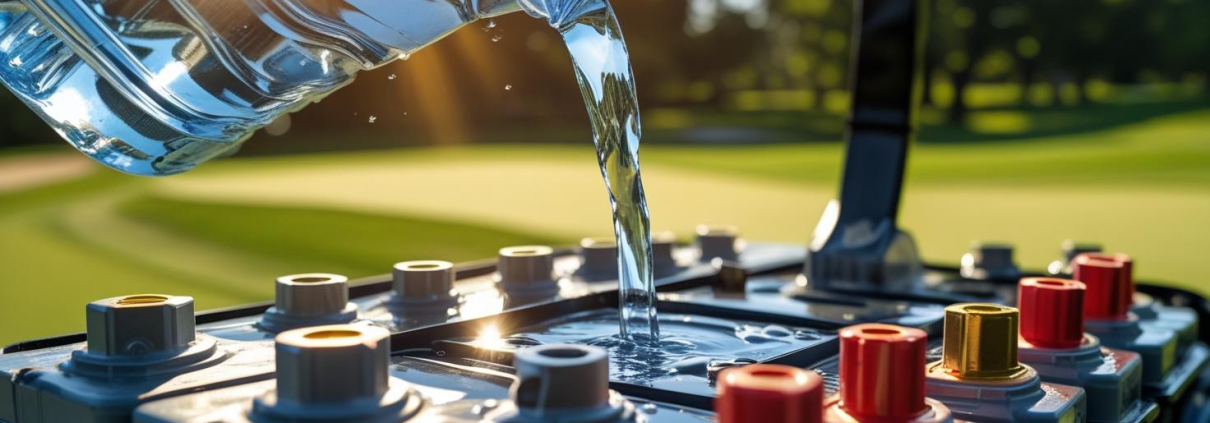What Kind of Water Should You Use for Golf Cart Batteries? An Expert Guide for Long-Lasting Performance
Introduction
If you own a golf cart with traditional flooded lead-acid batteries, you’ve probably heard that “you need to add water.” But the question many owners ask is: what kind of water should you use for golf cart batteries?
The wrong choice could shorten battery life, reduce performance, and cost you money. In this guide, we’ll explain the science behind water quality, show you how usage patterns affect maintenance needs, answer common questions, and compare different battery technologies—including options that require no watering at all.
- Why Water Quality Matters: The Science Behind It
A flooded lead-acid battery stores energy using lead plates immersed in an electrolyte solution made of sulfuric acid and water.
When water evaporates during charging, it must be replaced—but the quality of that water directly affects the health of the battery.
The problem with minerals:
Tap water contains dissolved minerals such as calcium, magnesium, and iron. These minerals deposit on the battery’s lead plates, forming a hard scale that increases internal resistance. Over time, this:
- Reduces charging efficiency
- Causes uneven plate activity
- Leads to premature battery failure
Visual aid suggestion: Imagine two identical lead plates—one in pure distilled water, the other in mineral-rich tap water. Over months of charging, the tap water plate develops crusty deposits that block chemical reactions, while the distilled water plate remains clean.
- The Best Water for Golf Cart Batteries: Distilled Water
Distilled water is water that has been boiled into vapor and condensed back into liquid, removing nearly all minerals and impurities.
It’s the industry gold standard for topping up flooded lead-acid batteries.
What about deionized water?
Deionized water is also very pure and safe for batteries, though it may still contain trace organic compounds. If distilled water is unavailable, high-quality deionized water is an acceptable alternative.
What NOT to use:
- Bottled mineral water (contains minerals)
- Rainwater (can contain dust, acids, or organic matter)
- Tap water (minerals + chlorine)
For a deeper dive into why distilled water is ideal and how lithium batteries eliminate the need for watering, check out The Role of Distilled Water in Golf Cart Battery Care – Understanding the Benefits of Lithium Batteries.
- Maintenance Frequency by Usage Scenario
Not every golf cart owner will top up water at the same rate. Factors such as climate, charging habits, and how often you drive all play a role.
| Usage Type | Climate | Check Water Level |
| High-frequency use (daily) | Hot/summer | Every 1–2 weeks |
| High-frequency use (daily) | Cool/winter | Every 3–4 weeks |
| Low-frequency use (weekends) | Hot/summer | Every 4 weeks |
| Low-frequency use (weekends) | Cool/winter | Every 6–8 weeks |
Tip: In hot climates, evaporation rates are higher. Always check more often in summer months.
- When and How to Add Water
Always water after charging, not before. Charging causes electrolyte expansion—adding water first can lead to overflow and corrosion.
Steps:
- Fully charge the battery.
- Check water level—plates must be fully covered but not overfilled.
- Use a clean funnel or battery water bottle.
For a step-by-step visual guide, see How to Add Water to Golf Cart Batteries – A Step-by-Step Maintenance Guide.
- Common Watering Mistakes to Avoid
- Using tap water → leads to mineral buildup
- Overfilling → causes electrolyte spillover
- Neglecting checks → exposes plates, causing irreversible damage
- Technology Comparison: Flooded vs AGM vs Gel vs Lithium
If you’re tired of checking and adding water, other battery types may better suit your needs. Here’s how they compare:
| Battery Type | Needs Watering? | Maintenance Level | Typical Lifespan | Upfront Cost |
| Flooded Lead-Acid | Yes | High | 3–5 years | Low |
| AGM | No | Low | 4–6 years | Medium |
| Gel | No | Low | 4–6 years | Medium |
| Lithium | No | Very Low | 8–12 years | Higher |
For users seeking true low-maintenance and longer lifespan, lithium golf cart batteries eliminate watering altogether. See the 12V LiFeLi Battery for an example of a maintenance-free option.
- Golf Cart Battery Water FAQs
Q1: Can you use bottled water in golf cart batteries?
Not recommended—many bottled waters contain minerals that can damage plates.
Q2: Is rainwater safe for golf cart batteries?
No—rainwater can pick up pollutants from the air and your roof.
Q3: Can you use tap water temporarily?
In emergencies, you can, but it will shorten battery life. Replace with distilled water as soon as possible.
Q4: Do lithium batteries need water?
No—lithium batteries are sealed and maintenance-free.
Conclusion
Choosing the right water for your golf cart batteries is a small decision with big consequences. Distilled water keeps your batteries clean inside, extends their life, and ensures peak performance. Combine the right water choice with a regular maintenance schedule, and your golf cart will thank you with reliable service for years to come.


